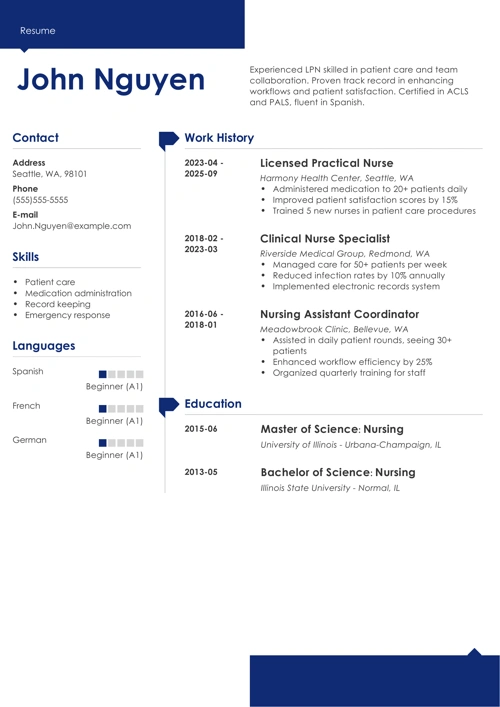So the hiring manager has read to the end of your cover letter. That’s great!
They blink a couple of times. No enclosures? They guess you didn’t send the two letters of recommendation they asked for. Into the garbage it goes.
The thing is, that business disaster could have been averted by using a professional cover letter enclosure. Let me show you how.
Want to write your cover letter fast? Use our cover letter builder. Choose from 20+ professional cover letter templates that match your resume. See actionable examples and get expert tips along the way.
Sample cover letter for a resume—See more cover letter samples and create your cover letter here.
More interested in how to end your cover letter effectively? Check out our guide dedicated to just that: How to Sign Off a Cover Letter
What is an Enclosure in a Cover Letter?
A cover letter enclosure appears at the very end of your cover letter and refers to any additional documents that you’ve attached to your job application. These could include things like a resume, letters of recommendation, school transcripts, certificates, and essays.
Does this sound like overkill?
Perhaps, but it’s actually quite helpful. Have you ever seen the typical recruiter’s desk(top)? It’s super simple for your submission to pull an Amelia Earhart in that wide ocean of job applications, but the cover letter enclosure makes it very clear which and how many documents belong to you. It also shows that you’re a total pro.
That said, there’s no need to go overboard with enclosures if the job ad doesn’t ask for them. That is definitely overkill.
Read more: What Should a Cover Letter Include?
How to Add an Enclosure to Your Cover Letter
Now that you know what an enclosure on a cover letter is, let’s get into the nitty-gritty of how it actually works and what you need to include.
- Create a list of the documents you’re going to include with your cover letter off to the side.
- Find your name at the end of your cover letter and double space after that.
- Type the word “Enclosure:” for one document, “Enclosures:” for two or more. It’s also ok to use the cover letter enclosure notation “Encl.:”.
- Skip a line and then begin to list each of your enclosures. Remember that each enclosure gets its own line, so, for example, four enclosures need four lines. Do not put numbers indicating how many enclosures you have.
- Reread each line for any spelling errors.
Read more: How to Format a Cover Letter
Cover Letter Enclosure Examples
Here are a couple of cover letter enclosure samples to show you the theory put into practice.
| Right |
|---|
|
Sincerely, Ryan Gunter Enclosure: Resume |
| Right |
|---|
|
Sincerely, Ryan Gunter Enclosures: Resume Application form Letter of recommendation |
| Wrong |
|---|
|
Sincerely, Ryan Gunter Enclosures: 3 (resume, 2 letters of recommendation) |
That wrong example is really cluttered and hard to read. Are there two enclosures? Three?
The right example shows very clearly what you’ve included and the recruiter can easily collect your entire job application. That's how to format a cover letter enclosure.
Read more: What Should Your Cover Letter Say
Creating a resume with our builder is incredibly simple. Choose a resume template and follow our step-by-step guidance to have a professional resume ready in minutes.
When you’re done, Zety’s resume builder will score your resume and our ATS resume checker will tell you exactly how to make it better.
Key Takeaway
Cover letter enclosures are just as important in business as they are in your job hunt. Use them to your advantage and show the hiring manager that you’re the candidate they’re waiting for.
When adding your cover letter enclosures, remember to keep these things in mind:
- Add your enclosure at the end of your cover letter.
- Use the singular or plural form depending on the number of documents you’ll be submitting. Use a colon after the word.
- Use one line for each individual enclosed document.
There you have it. Easy as pie!
We evaluated 11 million resumes created using our builder and found that these are the top 10 professions that often include a cover letter:
- Business Operation Specialists
- Top Executives
- Advertising, Marketing, and PR Managers
- Clerks
- Engineers
- Retail & Sales Representatives
- Healthcare Practitioners
- Financial Specialists
- Teachers and Instructors
- Counselors, social workers, and social service specialists
About Zety’s Editorial Process
This article has been reviewed by our editorial team to make sure it follows Zety's editorial guidelines. We’re committed to sharing our expertise and giving you trustworthy career advice tailored to your needs. High-quality content is what brings over 40 million readers to our site every year. But we don't stop there. Our team conducts original research to understand the job market better, and we pride ourselves on being quoted by top universities and prime media outlets from around the world.


![Cover Letter Enclosure: What Does it Mean [Examples]](https://cdn-images.zety.com/pages/cover-letter-enclosure-ztus-cta1-cover-letter.webp)

